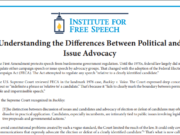On Monday, the Heritage Foundation hosted a panel of campaign finance experts to discuss recent developments such as the McCutcheon v. FEC Supreme Court ruling, the IRS’s stalled proposed rulemaking restricting the activities of 501(c)(4) social welfare organizations, and Sen. Udall’s constitutional amendment proposal under consideration in the U.S. Senate, which would amend the First Amendment. The panel featured Bobby Burchfield, partner at McDermott, Will and Emery; Don McGahn, former FEC Chairman; and Hans von Spakovsky, former FEC Commissioner and Senior Legal fellow and Manager of the Heritage Foundation’s Election Law Reform Initiative.
The three speakers described recent events in the realm of campaign finance as part of an ongoing attack on freedom of speech from politicians hostile to the First Amendment and groups who wish to further regulate political speech. Burchfield called the McCutcheon decision “plainly correct” and described the federal aggregate contribution limit at issue in the case as an attempt to “level the playing field” (which the First Amendment does not allow) disguised as an anti-corruption measure.
McGahn marveled at the vagueness of the Udall amendment and its promise of “political equality for all.” The proposed amendment seems to allow the government to silence speech selectively. McGahn also criticized the amendment’s press exemption as insufficient and exclusionary to bloggers and other groups that fall outside of mainstream media corporations.
von Spakovsky noted that the Udall amendment would, for the first time in American history, roll back the Bill of Rights. He also challenged the silly idea that the Founding Fathers simply never considered the role of money in speech in crafting the First Amendment. As he pointed out, and as CCP has noted before, spending money was an important part of disseminating political speech in the 18th century, too. Thomas Paine’s Common Sense would not have swept up the colonies in revolutionary fervor if Benjamin Rush had not paid for its publishing. The Federalist Papers would not have won ratification for the Constitution if they had not been printed in newspapers across the new nation. Without money in politics, the United States may never have even existed.
In the question and answer period, Burchfield brought up an often understated but crucial point for thinking about money in politics: there may appear to be lots of spending in politics, but does it keep up with the knowledge voters need to make informed decisions on Election Day? Knowledge cannot be conveyed without speech, and speech costs money. If you feel voters are not as informed as they should be, it makes no sense to say there’s too much money in politics.
Asked about the motivation behind recent efforts to limit political speech, McGahn mentioned the upcoming midterm elections and the tenuous Democratic majority in the Senate and said “I guess desperate times call for desperate measures.” von Spakovsky suggested that the administration misjudged the politics on this issue, noting that the IRS proposed rulemaking on 501(c)(4) activities has been withdrawn after massive opposition from citizens and groups flooded the IRS with a record-setting number of public comments blasting the rule.
Events like today’s Heritage panel are important opportunities for campaign finance experts to share their views and communicate with the public. Many commonly held notions about money in politics – from how much “money in politics” there is, to what it’s spent on – are little more than myths or hyperbole. As efforts to restrict speech gain intensity, defenders of the First Amendment must also become more vocal.













